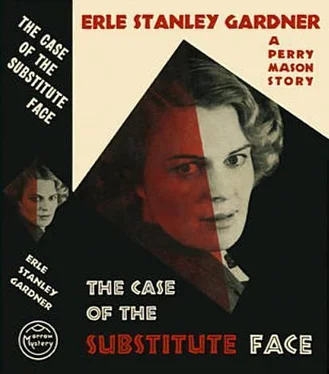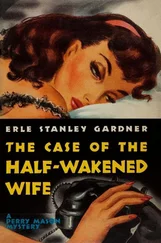“This scheme had been carefully thought out by Van Densie, Morgan Eves, and perhaps in part, by you. You knew that a Roger P. Cartman had been in an automobile accident and sustained a broken neck. You purchased a ticket in the name of Roger P. Cartman on the same steamship as that on which Mr. Moar traveled under the name of Carl Newberry. From time to time, Mr. Moar would surreptitiously visit your cabin. You would place a steel and leather harness, or brace, upon his neck so that it concealed much of his face, put on huge dark glasses which concealed his eyes, and wheel him about the deck in a wheel chair.
“On the night of the sixth you, having familiarized yourself with the custom of Aileen Fell of being on deck immediately after dinner, and feeling that this was a propitious time because of the storm, arranged to have Mr. Moar commit a supposed suicide by shooting himself and jumping overboard. You expected that the sound of revolver shots would attract Miss Fell’s attention so that she could see what apparently was the body of a man hurtling into the ocean.
“However, Miss Fell’s curiosity brought her up to the boat deck so in place of having Moar apparently a suicide, he seemed to be the victim of a murder, and his wife was accused of the murder.
“After Moar’s supposed plunge over the side, he went to your stateroom, where he became Roger P. Cartman, the invalid, and was actually carried off the steamer in a wheel chair, and taken to the flat on Stockton Boulevard.
“However, where the supposed suicide of Mr. Moar would have passed with only a small amount of notoriety, the supposed murder of Moar was an entirely different affair, and the situation became complicated when I dashed to Los Angeles and proved that Mr. Moar had not embezzled money from his former employer, the Products Refining Company. Therefore, Mr. Eves decided it would be better for you to leave the flat at Stockton Boulevard, since he felt some attempt might be made to trace Roger P. Cartman.”
“Now, he took you to a cabin up in the Santa Cruz Mountains, Miss Whiting. But did you know that after he had taken you there, he returned to the flat at Stockton Boulevard; that he then told Mr. Moar he had arranged for another place of concealment, placed him aboard a yacht, took him out by the Farallons, cruised about until he found one of the life rings which had been tossed overboard from the steamer the night before, shot Mr. Moar, stripped him of his clothes, placed his body in the life ring, and left it floating on the ocean, knowing that it would be discovered within a day or two.”
Mason paused, and Evelyn Whiting, gripping the arms of the chair with her gloved hands, moistened her lips and said nothing.
“You must have realized what had happened,” Mason went on, “when you read that Moar’s body had been found. Now then. Miss Whiting, it’s one thing to resort to jury bribing to shield a man whom you love. It’s quite another thing to become involved as an accessory on a murder charge. I think it’s time for you to tell the truth.”
She half rose from the chair, dropped back into it, looked helplessly about her, then slowly nodded her head. She raised her eyes to Judge Romley and said, “It’s true. I thought Morgan was innocent when he was being tried in Los Angeles. I thought the case was a frame-up against him, so I was willing to do everything I could. Mr. Van Densie said that if Morgan should be convicted, the district attorney would be able to frame a lot of Morgan’s business associates. He said these men had made up a purse to help my husband, and would give five thousand dollars for a hung jury, or twenty-five thousand for an outright acquittal. I explained the situation to Carl. I gave him my word that Morgan was innocent, and he managed to swing the jury. I made Carl Moar think the whole case was a frame-up, because I thought it was a frame-up.”
Mason said, “Now, you purchased a picture frame on the seventh, Miss Whiting.”
“Yes,” she said, “Carl was very much attached to his stepdaughter. In order to keep from being called as a witness, it was necessary for him to pretend to commit suicide and he knew that it would be years before he could ever see Belle again. He wanted her picture to keep with him. But he didn’t want his wife to know he’d taken this picture because that might make her suspicious of the suicide. So he switched pictures in the frame. Unfortunately, Mrs. Moar found out the pictures had been changed almost as soon as Carl had made the switch.”
“And you were the one who sent Carl Moar the note on the evening of the sixth?” Mason asked.
“Yes. We had it all planned. You see, we rigged up a dummy which we could throw overboard, and I left it up in the ship’s hospital. On the night of the sixth I waited until Miss Fell had come out on deck. Then I sent word to Carl. He was to come on deck. We were to drag the dummy to the rail and fire a couple of shots from a revolver to attract Miss Fell’s attention. Then we were to pitch the dummy overboard and leave Carl Moar’s gun where it would be found on the boat deck. Carl was to come down to my stateroom, climb into bed and put on the goggles and head brace, which would make it almost impossible to recognize him, particularly since we’d made such a careful build-up.”
“And how did it happen your dress got caught on one of the cleats?” Mason asked.
She said without hesitation, “Mrs. Moar made a mistake, leaving her wet clothes where they could be found. It showed she’d been on deck. If they searched my stateroom, I didn’t want them to find my wet clothes as evidence. I threw my dinner dress out of the porthole. By that time, the ship had turned around and the wind was blowing a gale. It caught my dress, tore it out of my hand, and sent it flying up in the air. I suppose a part of it caught on the cleat and the rest tore loose.
“Miss Fell had seen me dragging the dummy across the boat deck and your secretary, Miss Street, happened to be standing just below. She looked up and saw me as I pushed the dummy overboard and fired the second shot. I knew that she had run in and telephoned that a man was overboard, and I knew that sooner or later she’d be made to tell what she’d seen. You see, she was looking up into the rain, and therefore couldn’t see my features, but I was looking down and could see hers. The rain was in her eyes. It wasn’t in mine.
“Please understand me,” she pleaded, “I was willing to help the man I loved because I thought he was innocent. Then this morning when I read the papers, I knew why he’d left me up there in the mountains. He’d gone back and tricked Carl to his death. He figured that would keep Carl’s testimony from ever being given and that the murder would be charged to Mrs. Moar. I was sick. I loved him — I still love him — I can’t protect him now, though I see him for what he really is — even — I can’t stand back of him anymore— Tell me, Mr. Mason, since you seem to know all about it, he did — kill Carl, didn’t he?”
Her eyes, pleading and anxious, hoping against hope, rested on the lawyer’s face.
“Yes,” Mason said, “and he made the fatal mistake of leaving high-laced shoes on Moar’s body. You see, when Carl Moar was supposed to have gone overboard, he was dressed in a tuxedo. As soon as I saw the high-laced shoes on Moar’s body I realized what must have happened. The fact that the bullet in the body had been fired from a gun other than Moar’s gun was further convincing evidence. I’m sorry, Miss Whiting, but that’s what happened. And I’m not altogether blameless. I should have deduced the truth sooner than I did. Knowing that Moar had been on a jury in Los Angeles, that he had been instrumental in getting the defendant acquitted that Baldwin Van Densie, a notorious jury briber, had been the attorney representing that defendant and discovering that Carl had come into the unexplained possession of approximately twenty-five thousand dollars immediately after the verdict had been returned, should have been all I needed, particularly when one adds to that the fact that Belle Newberry’s picture, had disappeared from a suitcase to which only Mr. Moar had the key, and the lock showed no evidence of having been tampered with. I’m afraid, Miss Whiting, that the peculiar manner in which the case developed threw me off the track and prevented me from saving Carl Moar’s life.”
Читать дальше












